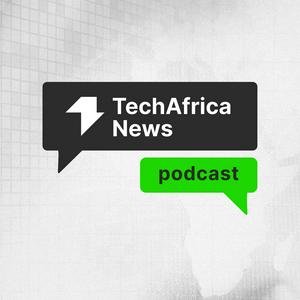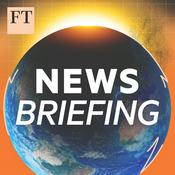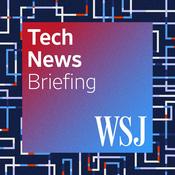12 episodes

EP.03 | S2 | 25 Years, 22 Million Lives: Vodacom Tanzania CEO Philip Besiimire on Transforming Connectivity
2025/11/30 | 1h 7 mins.
In this episode of the TechAfrica News Podcast, host, Chief Editor and Founder, Akim Benamara speaks with Philip Besiimire, CEO of Vodacom Tanzania, about the company’s 25-year journey, digital transformation, financial inclusion, technology innovation, and future opportunities in AI, cloud, fiber, and 5G.About Our Guest:Philip Besiimire is Managing Director of Vodacom Tanzania and a member of its Executive Committee. He joined Vodacom in 2022 after holding senior leadership roles at MTN across Africa. With over 15 years of experience in leadership, commercial execution, and mobile financial services, he brings deep expertise in driving growth and innovation in telecom. A Twenty-Five Year Journey of Growth and PurposeVodacom Tanzania has grown from near-zero connectivity to 22 million users. Besiimire highlights the company’s purpose-driven initiatives, such as M-Mama, a maternal health emergency system, demonstrating technology’s role in addressing societal challenges. Financial Inclusion and M-PesaM-Pesa has expanded financial access from under 26% to over 76% in five years, serving over 10 million active users. Vodacom now offers credit, micro-loans, and business tools, empowering individuals and SMEs and reducing reliance on informal lenders.Policy, Regulation, and Digital Skills EmpowermentBesiimire emphasizes balanced taxation and enabling policies to support Tanzania’s Vision 2050. Vodacom also drives digital education programs, including Code Like a Girl and mobile computer labs, equipping youth with skills for STEM and ICT careers.So I think, for me, it's about harmonization of those policies, harmonization of regulatory demands, and trying to make sure that we find the right balance between the objective to collect revenue to obviously provide services to the citizenry, but also allow the sector and industry to grow in such a way that we all lead up to the 2050 vision that has been articulated.” - Philip Besiimire, Chief Executive Officer, Vodacom Tanzania AI, Technology Diversification, and Sectoral ImpactAI enhances Vodacom’s customer experience, network monitoring, and enterprise services, while ethical standards safeguard data. Vodacom also expands into IoT, HealthTech, AgriTech, utilities, mining, and smart cities, delivering national-level impact.Network Modernization, 5G, and the Future of Tanzania’s Digital LandscapeVodacom is investing $100M in 4G/5G upgrades, fiber expansion, and satellite integration. Looking ahead, Besiimire identified three priorities for Tanzania’s digital future: policy certainty to unlock long-term investment, lower device costs to accelerate smartphone penetration, and sustained investment in digital skills, particularly AI and ICT.Thank you for listening The TechAfrica News Podcast in Partnership with Smart Africa! For more insights, subscribe to our podcast and visit:www.techafricanews.com/podcast If you enjoyed this episode, please leave a review and share it with your network. © 2025 TechAfrica News & The TechAfrica News Podcast. All rights reserved.

EP.02 | S2 | World Bank IFC’s Aliou Maiga on AgTech: Jobs, Data, and Connecting 5M African Farmers by 2030
2025/9/29 | 38 mins.
What does it take to turn farming from subsistence into a growth engine for Africa?In this episode of the TechAfrica News Podcast, Chief Editor and Founder Akim Benamara sits down with Aliou Maïga, IFC’s Regional Director for the Financial Institutions Group (FIG) in Africa, to discuss how AgTech is reshaping agriculture. From boosting yields and incomes for smallholder farmers to de-risking lending and using AI for crop management, the conversation explores how technology, finance, and data can drive food security and jobs across the continent.About Our GuestAliou Maïga is IFC’s Regional Director for the Financial Institutions Group (FIG) in Africa, where he leads investment and advisory operations, sector reforms, and strategy across the region. With over 20 years at IFC, he has held senior roles in Africa and Asia, including Resident Representative in Ethiopia, Regional Manager for East Asia and the Pacific, and Regional Director for West and Central Africa.Agriculture at the Heart of DevelopmentAgriculture employs up to 80 percent of Africa’s workforce and contributes as much as 40 percent of GDP. “If you want to create jobs in Africa, the biggest employer in Africa is agriculture,” Maïga said.AgTech’s PromiseAgTech firms act like fintechs for farming—digitising operations, linking farmers to inputs, insurance, and markets, and reducing risk for lenders. As Maïga explained, they are “an ERP behind every farmer.”“Technology has transformed every sector that it was injected into. You look at finance 50 years ago, and more recently the whole fintech revolution. But for some reason, agriculture has remained out of that movement. What we're trying to do is to inject technology in agriculture to make it efficient and productive as much as technology has done for other sectors.”- Aliou Maiga, Regional Industry Director for the Financial Institutions Group in Africa, IFC Real-World Impact Pilots in Morocco raised yields by 30 percent and incomes by more than 50 percent, while Nigeria’s Babban Gona integrates credit, storage, and profit-sharing. Most AgTechs blend digital platforms with local field agents to support farmers directly.Mindset and Risk PerceptionBanks and policymakers remain cautious, often financing only post-harvest activities. IFC is working to shift this view by piloting models and sharing risks to build trust in pre-harvest financing.Data and ReachDigitisation makes farmers investable and gives governments tools for better policies. With mobile coverage at about 70 percent, AgTech agents extend services to rural communities, bridging the last mile.Scaling the FutureIFC aims to reach 5 million farmers by 2030. Maïga called this “very small,” noting the larger opportunity. With AI now able to detect plant disease from simple photos, he believes AgTech is key to self-reliance, food security, and growth.This episode was recorded on the 30 July 2025 at IFC Johannesburg.Thank you for listening The TechAfrica News Podcast in Partnership with Smart Africa! For more insights, subscribe to our podcast and visit:www.techafricanews.com/podcast If you enjoyed this episode, please leave a review and share it with your network. © 2025 TechAfrica News & The TechAfrica News Podcast. All rights reserved.

EP.01 | S2 | Safaricom's CEO Dr. Peter Ndegwa on 25 Years, $800M Daily on M-Pesa, and What’s Next
2025/9/29 | 33 mins.
What does it take to move from being a telecom operator to a purpose-led technology company?In this episode of the TechAfrica News Podcast, Chief Editor and Founder Akim Benamara sits down with Dr. Peter Ndegwa (CBS), CEO of Safaricom Group PLC, to explore the company’s 25-year journey, the evolution of M-Pesa, and its bold expansion into Ethiopia. From tackling Africa’s device gap to harnessing AI and satellite, the conversation reflects on how innovation, inclusion, and investment are shaping the continent’s digital future.About Our GuestDr. Peter Ndegwa (CBS) is the CEO of Safaricom Group PLC, Africa’s leading technology company and pioneer of M-Pesa, serving more than 53 million customers across Kenya and Ethiopia. Since joining in 2020, he has led Safaricom’s shift from telecom to tech company, spearheaded its entry into Ethiopia, and strengthened its social impact through the Safaricom and M-Pesa Foundations.Safaricom at 25: A Legacy of TransformationFrom its start as a Telkom Kenya department to a $2.5B enterprise, Safaricom has grown into one of Africa’s most influential companies. Alongside, M-Pesa—turning 18 this year—has expanded financial access and powered half of Kenya’s GDP flows.M-Pesa: From Payments to Financial HealthWith 36 million monthly users and $800M transacted daily, M-Pesa has moved beyond payments into credit, savings, and insurance. “Accumulating wealth is not about richness; it is just about savings,” Ndegwa noted. AI is now strengthening fraud prevention and personalising services.Bridging the Device GapSafaricom is making 4G phones affordable through local assembly and pay-as-you-go models like Lipa Mdogo Mdogo, aiming to make internet access universal.Satellites as Partners, Not RivalsSatellite services will not replace networks but complement them, especially in rural areas, healthcare, and backhaul. Africa, Ndegwa believes, will be the biggest beneficiary.“The terrestrial network is now established, and there has been a lot of investment that has been put there. Satellite, we see it as an opportunity to come and complement the terrestrial network, especially since there are still so many rural areas. We will see satellite supporting terrestrial networks to ensure that coverage is achieved. Africa will probably be the biggest beneficiary of satellite because it reduces the need for heavy infrastructure investment. This also means the cost of delivering connectivity becomes lower. I fully agree that in Africa, satellite will likely play a bigger role than in the West.”– Dr. Peter Ndegwa, CEO, SafaricomEthiopia: Growth FrontierSafaricom’s $2.3B push into Ethiopia has already brought 10M new users. With 125M people, the market could outgrow Kenya in scale, supported by the newly launched Safaricom Ethiopia Foundation.Looking AheadAfrica’s young, digital-first population could unlock a leap in jobs and innovation. “We have shown in mobile money that we can actually do much better than any country in the West,” Ndegwa said, pointing to AI and digital tools as the next accelerators.This episode was filmed on: 7 July 2025 in JohannesburgThank you for listening The TechAfrica News Podcast in Partnership with Smart Africa! For more insights, subscribe to our podcast and visit:www.techafricanews.com/podcast If you enjoyed this episode, please leave a review and share it with your network. © 2025 TechAfrica News & The TechAfrica News Podcast. All rights reserved.

EP.09 | PortaOne on Africa’s Telecom Shift: MVNO Models, Market Gaps, and IoT Opportunities
2025/7/14 | 33 mins.
What if Africa’s telecom future isn’t about bigger networks—but smarter, sharper services that actually understand their users? In this episode of the TechAfrica News Podcast, Chief Editor and Founder Akim Benamara sits down with Roman Khalenkov, Chief Commercial Officer at PortaOne, for a wide-ranging look at Africa’s evolving telecom space. With over two decades of experience across product strategy, sales, and consulting, Khalenkov brings grounded insight into where the industry is headed—and what’s still holding it back. About Our Guest Roman Khalenkov is a seasoned executive with over two decades of experience in the telecommunications industry. His career spans leadership roles across sales, organizational management, product development, management consulting, and marketing strategy. As Chief Commercial Officer at PortaOne, he continues to shape the future of digital infrastructure, bringing a rare blend of technical insight and commercial acumen to every conversation. Telecom’s Evolution: From Fax Machines to Smart Devices Khalenkov opens with a reflection on Africa’s mobile-first development. Unlike markets burdened by outdated systems, many African countries skipped straight to digital, creating space for faster transformation. “We don’t see fax machines here,” he quipped—marking how Africa often bypasses what others must phase out. Fragmented Markets, Uneven Regulation He quickly adds nuance: Africa isn’t one telecom market—it’s over 50, each with its own rules. South Africa, with minimal licensing barriers, fosters innovation. Nigeria, in contrast, has issued MVNO licenses but lacks a clear business framework, leaving many operators stalled. The Three MVNO Models That Work Khalenkov outlines three MVNO models gaining traction: Franchise Replication across borders (e.g. Lebara). High-volume IoT deployments to offset low ARPU. Niche, high-margin segments like sea-to-shore connectivity. Success, he notes, comes from knowing your market, not just having the tech. Smart Software, Smarter Scaling For PortaOne, software is what turns ideas into operational scale. Billing, CRM, KYC systems—they all need to work together. With automation and integration tools now more accessible, even smaller providers can deliver a seamless customer experience. On AI: A Tool, Not a Revolution—Yet While AI dominates headlines, Khalenkov remains cautious. “It’s not a game changer—yet,” he says. For now, AI is best suited to support functions like call centres and technical support, where structure and automation matter more than novelty. “I think it's premature today to talk about AI as a game changer, specifically in telecoms. It will come there eventually, and we can speak about how I see where it will come first. But today, I simply don't see that as more than just an additional piece of functionality. - Roman Khalenkov, Chief Commercial Officer, PortaOne This episode was filmed on: 13 November 2024 in Cape TownThank you for listening The TechAfrica News Podcast in Partnership with Smart Africa! For more insights, subscribe to our podcast and visit:www.techafricanews.com/podcast If you enjoyed this episode, please leave a review and share it with your network. © 2025 TechAfrica News & The TechAfrica News Podcast. All rights reserved.

EP.08 | Reinventing Africa: Accenture on AI, Access, and the Urgency to Transform
2025/6/27 | 44 mins.
In this episode of the TechAfrica News Podcast, Chief Editor and Founder, Akim Benamara, sits down with Nitesh Marcel Singh, Managing Director for Communications, Media, and Technology at Accenture, for a wide-ranging discussion on the future of digital transformation across the continent. With over 20 years in telecom and technology, Singh brings sharp insights into AI adoption, data readiness, and enterprise reinvention in Africa.From falling telco margins to the cost of devices, Singh explores the barriers holding Africa back—and what it will take to move forward. Can Africa build the infrastructure, skills, and policy environment to lead in the digital era? About Our Guest Nitesh Singh is Managing Director for Communications, Media, and Technology at Accenture Africa. With over two decades in the sector, he has led key digital transformation efforts across the continent and champions data, AI, and cloud as strategic pillars for growth. AI as a Strategic Tool, not a Trend Singh shares Accenture’s “total enterprise reinvention” model, anchored on a digital core of AI, cloud, and structured data. Many African firms, he notes, still lack a clear AI strategy or business case to realise meaningful value.Data as the Bedrock of Progress AI cannot succeed without clean, structured data. Singh warns that many organisations overlook this prerequisite—and highlights the urgent need for data science and engineering talent to bridge the gap.Recasting the Telco Sector’s Role Telcos are central to Africa’s digital growth but remain heavily constrained by taxes and regulation. He stresses the need for policy reform. "The problem in Africa is regulation. The regulatory frameworks are not conducive to telcos. A sector that's connecting population groups and leading to GDP is paying too much tax. Governments across Africa are seeing this the wrong way. Instead of levying more taxes, they should actually lower taxes, get them to connect their populations more, and there'll be more growth rather than see it as a cash cow to extract out of the telco. So, the government regulatory framework is a problem." - Nitesh Singh, Managing Director for Communications, Media, and Technology, AccentureThe Device Divide and Local Manufacturing Affordability remains a barrier to access. With little local production of smartphones or infrastructure, he calls for investment in manufacturing to cut costs, build skills, and unlock new economic opportunities.On Education, Learning, and the Next Generation To keep pace, Singh urges a shift in how young people are taught to learn—with AI as a tool, not a crutch. He advocates early exposure to technology alongside a focus on informatics, engineering, and maths.Governance, Policy, and the Need for Continental Alignment From visa restrictions to outdated regulations, Singh highlights how policy misalignment is stalling progress. He calls for unified goals, measurable national KPIs, and more accountability across governments.This episode was filmed on: 12 November 2024 in Cape TownThank you for listening The TechAfrica News Podcast in Partnership with Smart Africa! For more insights, subscribe to our podcast and visit:www.techafricanews.com/podcast If you enjoyed this episode, please leave a review and share it with your network. © 2025 TechAfrica News & The TechAfrica News Podcast. All rights reserved.
More News podcasts
Trending News podcasts
About The TechAfrica News Podcast
Listen to The TechAfrica News Podcast, Global News Podcast and many other podcasts from around the world with the radio.net app

Get the free radio.net app
- Stations and podcasts to bookmark
- Stream via Wi-Fi or Bluetooth
- Supports Carplay & Android Auto
- Many other app features
Get the free radio.net app
- Stations and podcasts to bookmark
- Stream via Wi-Fi or Bluetooth
- Supports Carplay & Android Auto
- Many other app features


The TechAfrica News Podcast
download the app,
start listening.



































